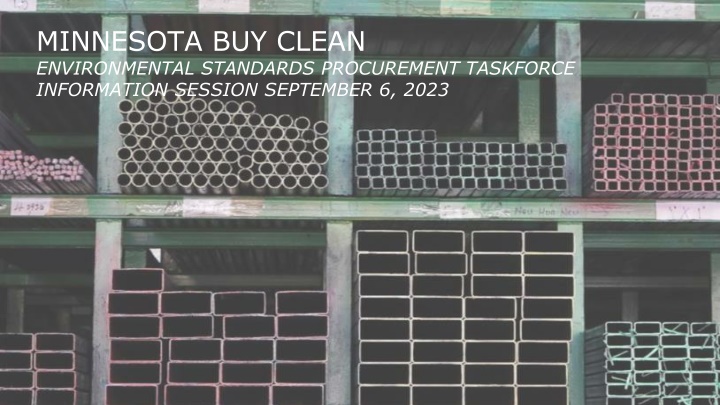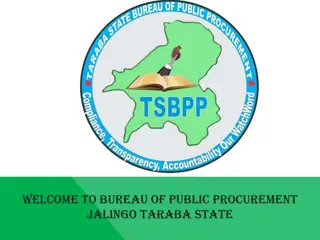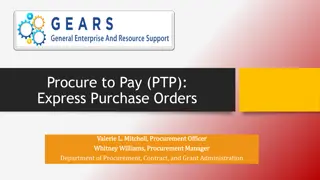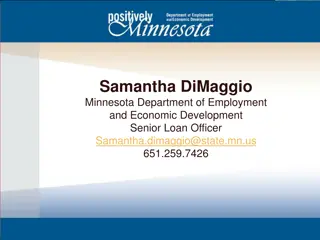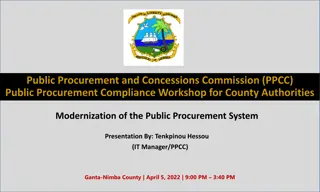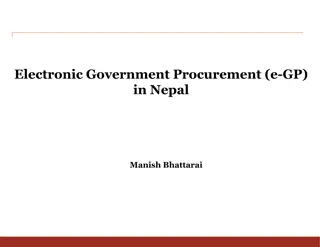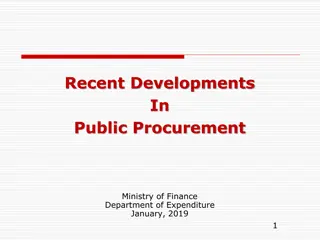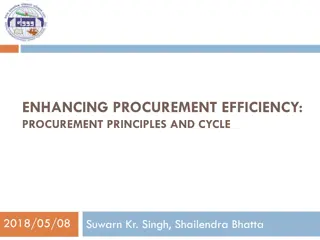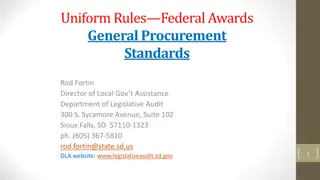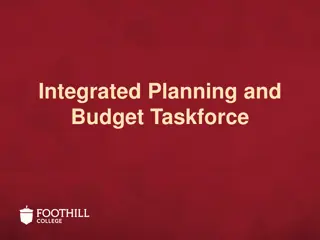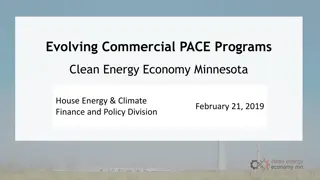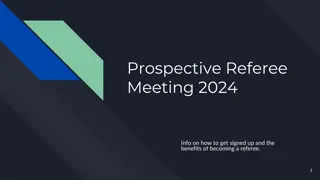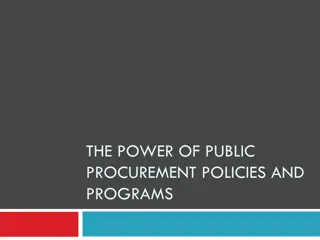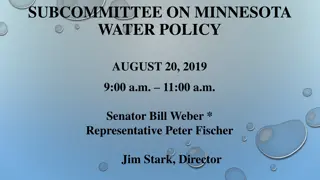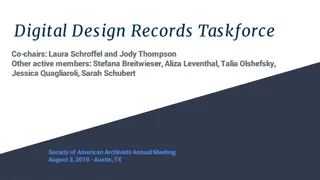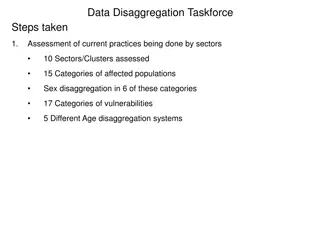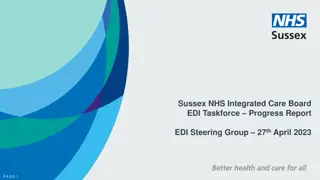Minnesota Buy Clean Environmental Standards Procurement Taskforce Information Session
In September 6, 2023, the Minnesota Buy Clean Environmental Standards Procurement Taskforce will hold an information session discussing the establishment of global warming impact standards for construction materials used in state buildings and roads. The session will cover goals such as developing methods for setting maximum global warming potential and collaborating with various departments to implement environmentally friendly practices in procurement. Key figures from different sectors will be present to address legislative changes and initiatives towards a cleaner environment.
Download Presentation

Please find below an Image/Link to download the presentation.
The content on the website is provided AS IS for your information and personal use only. It may not be sold, licensed, or shared on other websites without obtaining consent from the author.If you encounter any issues during the download, it is possible that the publisher has removed the file from their server.
You are allowed to download the files provided on this website for personal or commercial use, subject to the condition that they are used lawfully. All files are the property of their respective owners.
The content on the website is provided AS IS for your information and personal use only. It may not be sold, licensed, or shared on other websites without obtaining consent from the author.
E N D
Presentation Transcript
MINNESOTA BUY CLEAN ENVIRONMENTAL STANDARDS PROCUREMENT TASKFORCE INFORMATION SESSION SEPTEMBER 6, 2023
Team Richard Graves, FAIA - Director, Center for Sustainable Building Research Garrett Mosiman - Senior Research Fellow, Center for Sustainable Building Research Betsy Hayes - Assistant Commissioner, Minnesota Department of Administration Wayne Waslaski - Assistant Commissioner, Minnesota Department of Administration Julie Bayerl - Legislative Director, Minnesota Department of Administration Curt Turgeon, Office of Materials and Road Research (OMRR), MnDOT Daniel (Danny) Saunders, Office of Environmental Stewardship, MnDOT Emil Bautista, Office of Materials and Road Research (OMRR), MnDOT Joe Nietfeld, Office of Materials and Road Research (OMRR), MnDOT
Legislation In the 2023 Legislative session, a bill was passed relating to state purchasing; requiring the establishment of global warming impact standards for certain construction materials used in state buildings and roads;integrating those global warming standards into the procurement process; establishing pilot programs to report greenhouse gas emissions from the manufacture of certain products; establishing a grant program; establishing a technical advisory committee; requiring reports; proposing coding for new law in Minnesota Statutes, chapter 16B. (Ch. 60, Article 12, Sec. 1, Subd. 5).
Goals 1.Review background research on high embodied carbon materials for vertical and horizontal construction. 2.Develop a method for setting maximum global warming potential in Environmental Product Declarations for Steel and Concrete by 1/15/2025. 3.Develop a method for setting maximum global warming potential in Environmental Product Declarations for Steel Rebar and Asphalt by 1/15/2027. 4.Support the work of the establishment of the Environmental Standards Procurement Taskforce 5.Support the creation of a grant program to manufacturers 6.Develop a concept for a Pilot Program 7.Review and recommend options for a Materials Database 8.Coordinate with the Federal Buy Clean Taskforce 9.Draft a Report for the Legislature by 2/1/2025.
Environmental Standards Procurement Taskforce Subd. 5. Environmental Standards Procurement Task Force. (a) No later than October 1, 2023, the commissioners of administration and transportation must establish an Environmental Standards Procurement Task Force to examine issues surrounding the implementation of a program requiring vendors of certain construction materials purchased by the state to: (1) submit environmental product declarations that assess the material production life cycle environmental impacts of the materials to state officials as part of the procurement process; and (2) meet standards established by the commissioner of administration that limit greenhouse gas emissions impacts of the materials. (b) The task force must examine, at a minimum, the following: (1) which construction materials should be subject to the program requirements and which construction materials should be considered to be added, including lumber, mass timber, aluminum, glass, and insulation; (2) what factors should be considered in establishing greenhouse gas emissions standards, including distinctions between eligible material production and manufacturing processes, such as integrated versus secondary steel production; (3) a schedule for the development of standards for specific materials and for incorporating the standards into the purchasing process, including distinctions between eligible material production and manufacturing processes; (4) the development and use of financial incentives to reward vendors for developing products whose greenhouse gas emissions are below the standards; (5) the provision of grants to defer a vendor's cost to obtain environmental product declarations; (6) how to ensure that lowering environmental product declaration values does not negatively impact the durability or longevity of construction materials or built structures; (7) how to create and manage a database for environmental product declaration data that is consistent with data governance procedures of the state and is compatible for data sharing with other states and federal agencies; (8) how to account for differences among geographical regions with respect to the availability of covered materials, fuel, and other necessary resources, and the quantity of covered materials that the department uses or plans to use; (9) coordinating with the federal Buy Clean Task Force established under Executive Order 14057 and representatives of the United States Departments of Commerce, Energy, Housing and Urban Development, and Transportation; Environmental Protection Agency; General Services Administration; White House Office of Management and Budget; and the White House Domestic Climate Policy Council; (10) how the issues in clauses (1) to (9) are addressed by existing programs in other states and countries; and (11) any other issues the task force deems relevant. (c) The task force shall make recommendations to the commissioners of administration and transportation regarding: (1) how to implement requirements that maximum global warming impacts for eligible materials be integrated into the bidding process for eligible projects; (2) incentive structures that can be included in bidding processes to encourage the use of materials whose global warming potential is below the maximum established under subdivision 2; (3) how a successful bidder for a contract notifies the commissioner of the specific environmental product declaration for a material used on a project; (4) a process for waiving the requirements to procure materials below the maximum global warming potential resulting from product supply problems, geographic impracticability, or financial hardship; (5) a system for awarding grants to manufacturers of eligible materials located in Minnesota to offset the cost of obtaining environmental product declarations or otherwise collect environmental product declaration data from manufacturers based in Minnesota; (6) whether to use an industry average or a different method to set the maximum allowable global warming potential, or whether that average could be used for some materials but not others; and (7) any other items the task force deems necessary in order to implement this section.
Environmental Standards Procurement Taskforce (d) Members of the task force must include but are not limited to representatives of: (1) the Departments of Administration and Transportation; (2) the Center for Sustainable Building Research at the University of Minnesota; (3) the Aggregate and Ready Mix Association of Minnesota; (4) the Concrete Paving Association of Minnesota; (5) the Minnesota Asphalt Pavement Association; (6) the Minnesota Board of Engineering; (7) the Minnesota iron mining industry; (8) building and transportation construction firms; (9) the American Institute of Steel Construction; (10) the Institute of Scrap Metal Recycling Industries; (11) suppliers of eligible materials; (12) organized labor in the construction trades; (13) organized labor in the manufacturing or industrial sectors; (14) environmental advocacy organizations; and (15) environmental justice organizations.
Environmental Standards Procurement Taskforce (d) Members of the task force must include but are not limited to representatives of: - 33-35 representatives (1) the Departments of Administration and Transportation; - Betsy Hayes, Admin and Curt Turgeon, MnDOT (2) the Center for Sustainable Building Research at the University of Minnesota; - Richard Graves, FAIA (3) the Aggregate and Ready Mix Association of Minnesota; - 2 representatives TBD (4) the Concrete Paving Association of Minnesota;- 2 representatives TBD (5) the Minnesota Asphalt Pavement Association;- 2 representatives TBD (6) the Minnesota Board of Engineering;- 4 representatives TBD (2 Architects and 2 Engineers) (7) the Minnesota iron mining industry;- 2 representatives TBD (8) building and transportation construction firms;- 4 representatives TBD (2 Building and 2 Transportation) (9) the American Institute of Steel Construction;- 2 representatives TBD (10) the Institute of Scrap Metal Recycling Industries;- 2 representatives TBD (11) suppliers of eligible materials;- 2-4 representatives TBD (12) organized labor in the construction trades;- 2 representatives TBD (13) organized labor in the manufacturing or industrial sectors;- 2 representatives TBD (14) environmental advocacy organizations; and- 2 representatives TBD (15) environmental justice organizations.- 2 representatives TBD
Environmental Standards Procurement Taskforce Nomination Form Google Form or email a PDF to rmgraves@umn.edu Task Force established by October 1, 2023
Discussion More information: rmgraves@umn.edu
